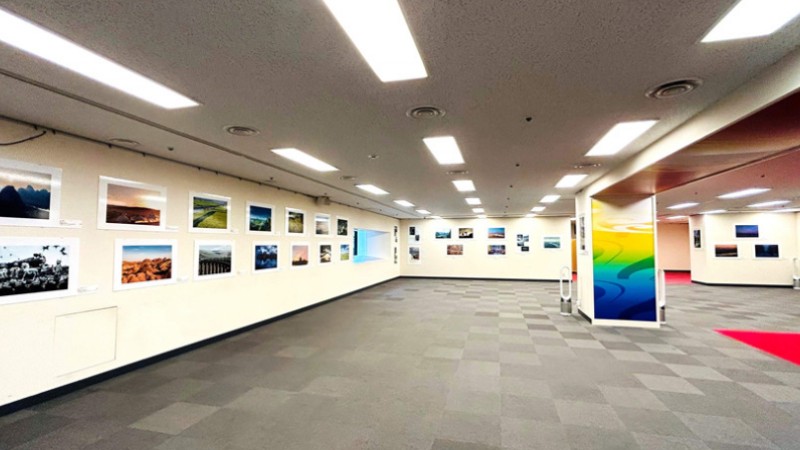Feature: Israeli branch of Chinese university fosters closer cultural, educational ties
JERUSALEM, Sept. 12 (Xinhua) -- "Learning Chinese not only enabled me to have a deeper understanding of Chinese civilization, but also helped me see China and the rest of the world from a wider perspective. Only through exchanges among different cultures can human civilization continue." Amit Portman, a sophomore from the Israeli campus of China's University of International Business and Economics (UIBE), said in his speech during the 22nd "Chinese Bridge" language proficiency competition held in Israel in June.
Four years ago, like many of his peers, Amit did not go to college right away after completing the mandatory military service required of young Israelis. Instead, he traveled and worked abroad while mulling over the plan for his future. He interacted with many Chinese tourists while working as a salesman for a cosmetics company in New Zealand, and he taught himself some Chinese language.
"Even though my knowledge of Chinese was very limited back then, I found that the Chinese people were very friendly and willing to continue the conversation with me. They would ask me where I was from, how old I was, and whether I had a girlfriend. Therefore, I couldn't help but assume that if I could speak more Chinese, a bridge of communication could be built," said Portman.
When Portman was going to submit an application to college, UIBE-Israel, the first overseas campus of a Chinese university in Israel, began to offer undergraduate programs to young people in the country in August 2021.
"My dream is to use Chinese language to bring Israeli-Chinese relations and people from the two countries closer," said Portman, who was successfully enrolled into the university in 2021 to study business management.
Matan Vilnai, president of UIBE-Israel, had served as Israel's ambassador to China from 2012 to 2017. After seeing firsthand China's rapid economic achievement and growing global influence, he has become more aware of the need to establish an educational institution to promote the exchanges among young people from Israel and China.
"When I was the ambassador, I used to say every day that we must build a bridge between the huge country China and the small state of Israel. This is not a bridge that you just put pillars and build it, it's something much more complicated. And then you have to strengthen the understanding between Chinese and Israelis," Vilnai told Xinhua on the UIBE-Israel campus.
China is important not only from a global perspective, but also in terms of relations with Israel, he said, citing statistics showing that the volume of bilateral trade has increased by hundreds of percent since China and Israel began trading in the 1990s and China will overtake the United States as Israel's top trading partner before 2035.
"If we want to intensify our commercial relations, we must know each other well. The vision of this university is to enhance the understanding between the two countries' young people by allowing them to sit in the same classrooms, listen to the same lectures, and take the same tests," he added.
Thousands of miles away, around 50 Israeli students from UIBE-Israel are wrapping off their long-awaited journey to China in Beijing. During their visit, they studied at the UIBE headquarters and traveled to the Great Wall. They also participated in the China-Israel Youth Science and Technology Innovation Training Camp in the China-Israel Changzhou Innovation Park in southeast China's Jiangsu province.
"The reason why this Chinese university is attractive is that it provides an academic platform, commercial knowledge, and mingled perspectives for those young Israelis with the aspiration of doing business with China in the future," said Netanel Vaknin, CEO and vice president of UIBE-Israel who is in charge of its operation and finance.
Vaknin himself has a story to tell about his association with China. When he was an undergraduate student majoring in East Asian studies at Tel Aviv University many years ago, he chose to study Chinese language. After graduation, he founded an organization that promoted joint projects for Chinese and Israeli companies.
Vaknin's early business experiences have strengthened his belief in China's development and increased his awareness of the importance of removing obstacles and fostering exchanges between Israel and China.
"I could feel that the business people of the two countries have a strong desire to strengthen cooperation, but there is an apparent wall given differences in culture and business models. What we are doing now is to train the next generation of young people who know how to act and succeed in the future with win-win results," he said.
Gadi Ravid, UIBE-Israel's vice president for academic affairs, is preparing his coursework for the new academic year. He told Xinhua that this course, which combines courses of business management and human resources, will explore the characteristics and differences between the two countries' innovative cultures.
"We're doing it because we have a strong motivation to fulfill the mission of the university, which is to combine the East and the West and to make people in the world understand each other, rather than believe in the rumors they hear," Ravid said.
Photos
Related Stories
- 1st Chinese Language Day launched in Australian capital
- Feature: Interest in learning Chinese language grows among Lao students
- Chinese artwork lights up summer night in Tel Aviv Port
- Sri Lankan president emphasizes importance of learning Chinese
- 200 Nepali tourism professionals receive Chinese language training
Copyright © 2023 People's Daily Online. All Rights Reserved.









